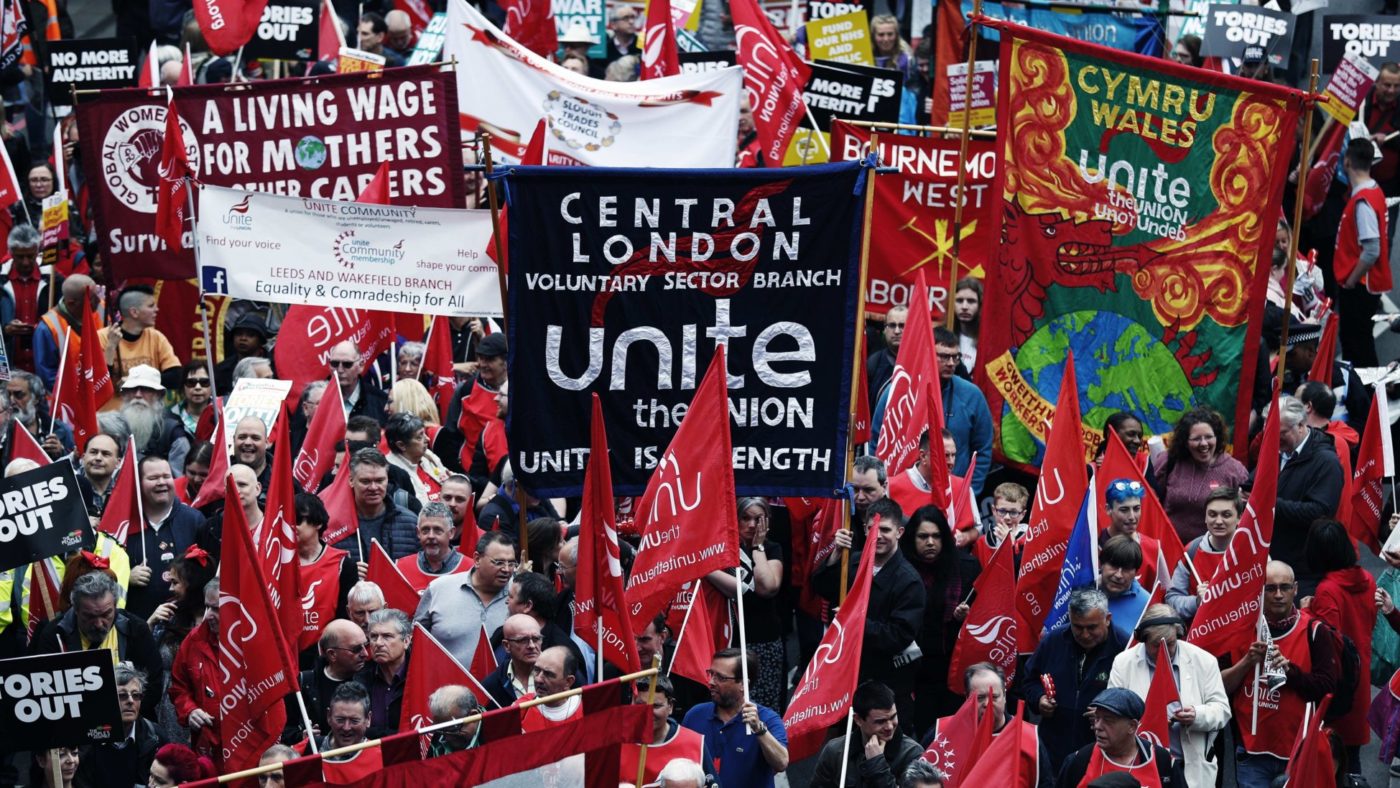The Trade Union Congress (TUC) argue that the proportion of national income allocated to wages has fallen over the past 40 years – and they’re right. They also say this is terrible – and they might be right. Finally, they tell us that we need stronger unions to reverse this – and that’s where they’re not right at all. Why? Because their analysis of why wage share has fallen is simply wrong.
Gross Domestic Product can be determined in three ways. You can add up the total value of goods and services produced in the market (ie production); you can add up total value of everybody’s income; or you can work out the country’s total spending by adding household spending, investment, government spending and net exports (or subtracting net imports).
We can thus measure the size of the economy by looking at any of the three. Here the TUC is using incomes. But it’s important to note that the income received by workers can be calculated in different ways. The wage share of the economy is the cash workers get in their pay packets; the labour share is that plus the other stuff – pension contributions, a free car, subsidised sarnies for lunch plus, crucially, the taxes that are paid for allowing us to go to work. Employers’ national insurance is part of the labour share but not the wage share.
This is really important to understand, so as to be able to counter the rhetoric being used.
The TUC is indeed right on the numbers: “The share of GDP going to wages has shrunk from an average of 57% between 1945 and 1975 to 49% in 2018″.
The next question should be, well, OK, why? The TUC argue it’s because the reduction in union membership and thus power has led to the capitalists getting more of everything. The only problem with this is that it’s not actually true.
GDP, that economic everything, is not divided into just capital and labour. There are actually four parts to it. Capital share, labour, mixed income – the incomes of the self-employed essentially – and then subsidies to production and taxes upon consumption. Those four together make up 100% of everything.
I know, I know, even the wonks in the front row with the coloured pencils are nodding off by now. But as I say, it’s important to understand this in order to grasp how they’re attempting to hoodwink us.
If we look at the facts, it’s clear the capital share hasn’t increased over those decades. Sure, there’s been a rise since the mid-70s but then there had to be. That has to cover not just profits but depreciation, or if you prefer the investment in keeping the machinery going. The levels in that Heath/Wilson nightmare weren’t even enough to pay for that, and the nation was eating its industrial base. The capital share today is approximately at its long-term post-WW II levels.
So if the labour share has fallen then where’s it gone if it’s not to the top hats? Partly there are more self-employed people around. That’s hardly a problem that needs a solution.
Another look at the facts reminds us that over that period taxes and subsidies have risen as a proportion of the labour share. Why? Because VAT is a tax upon consumption and that VAT rate has more than doubled.
So, the labour share has fallen because of more self employment and increases in VAT. Then within the labour share we’ve got that falling wage share. But the rate of employers’ national insurance has risen from 4.5% in 1960 to 13.8% today. Which does rather neatly explain that decline in that wage share.
Their solution is more unions. Wrong – because the cause of the smaller slice is government. Higher VAT, higher national insurance – more taxes in effect – reduces both those labour and wage shares. The answer, rather than more union power, is less government and reduced taxes.
But there is another reason why the TUC is wrong, one even closer to home. The majority of union members are in the public sector. They are, by definition, people being paid from the nation’s taxes. The TUC is insisting that there should be more union power because the wage share has fallen. But that has fallen because of the taxes needed to pay the union members. So their solution will actually make their identified problem worse. More public sector union power will increase the taxes which reduce the wage share.
This is thus casuistry at best, and proof – if any more were needed – that the details of economics are important. If we ignore them we are leave ourselves vulnerable to misinformation, dogma and rhetorical manipulation.
CapX depends on the generosity of its readers. If you value what we do, please consider making a donation.


